
EUROPEAN UNION FORCE IN BOSNIA I HERZEGOVINA
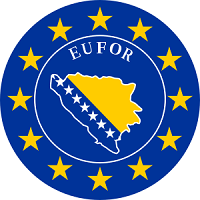
EUFOR ALTHEA is the European Union’s Military Contribution to the Stabilisation and Integration of Bosnia and Herzegovina.
Althea is regarded by many as the Greek goddess of healing. In myth, Althea, mother of Meleager, was told by the Gods that her son would die as soon as a piece of wood on her fire was consumed. Althea took the wood from the fire, extinguished it and placed the wood in a chest to preserve her son’s life. With the fire in Bosnia and Herzegovina extinguished, Operation ALTHEA will now assist the healing of the country and all its peoples. Unlike the myth, the wood will never again be taken from the chest but will remain preserved, safely, forever.
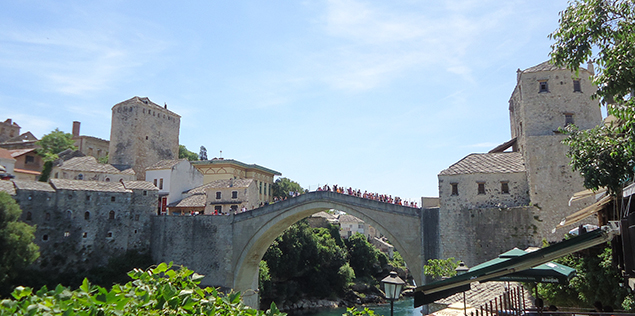
- Supporting the Armed Forces of Bosnia and Herzegovina (AFBiH) collective and combined training, supporting them in their progression towards NATO standards.
- To provide deterrence and continued compliance with the responsibility to fulfil the role specified in Annexes 1A and 2 of the Dayton/Paris Agreement (General Framework Agreement for Peace in BiH).
- To contribute to a safe and secure environment in Bosnia and Herzegovina (BiH), in line with its mandate, and to achieve core tasks in the OHR's Mission Implementation Plan and the Stabilization and Association Process (SAP).
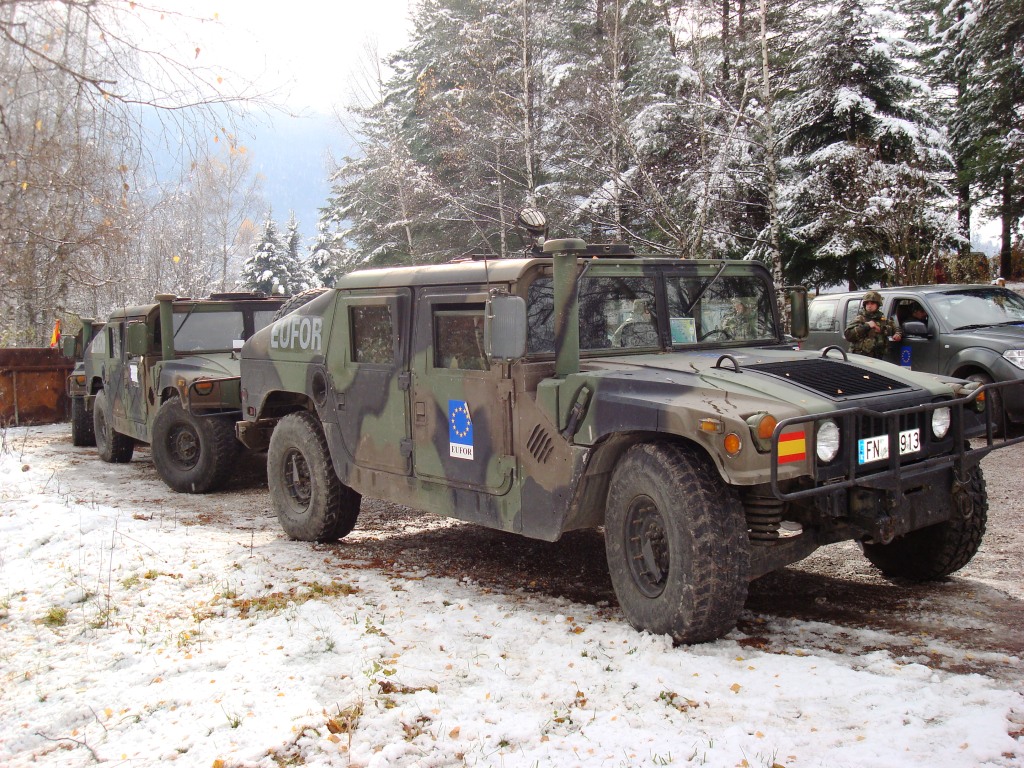
The mandate for EUFOR’s Operation Althea is in two parts, Executive and Non-Executive. The Executive mandate is given by the UN Security Council, and the EUFOR mission is then based on the EU Foreign Affairs Council (FAC) Joint Action which includes an Executive part derived from the UN Security Council (Supporting the BiH authorities maintain a safe and secure environment). It also includes and a Non-Executive part (Supporting AFBiH collective and combined training). This supports BiH in its progress to being a ‘security provider’ rather than a ‘security consumer’.
United Nations Security Council Resolution (UNSCR) 1551, adopted unanimously on 9 July 2004, welcomed the EU's intention to launch a military mission in BiH. The decision by the EU to launch ALTHEA followed the decision by NATO to conclude its successful SFOR-operation.
This was followed by UNSCR 1575, adopted unanimously on 22 November 2004 which authorized the Member States, acting through or in cooperation with the EU, to establish a multinational stabilization force (EUFOR) as a legal successor to SFOR, under unified command and control, which will fulfil its missions in relation to the implementation of Annex 1-A and Annex 2 of the Dayton/Paris Agreement. EUFOR has the main peace stabilization role under the military aspects of the Peace Agreement.
The Resolution also welcomed the EU’s increasing engagement in BiH. EUFOR's mandate was extended by UNSCR 1639 (2005) on 21 November 2005. ALTHEA is carried out with recourse to NATO assets and capabilities, on the basis agreed with NATO ("Berlin Plus"). In 2012 the Operation reconfigured and changed its focus to Capacity Building and Training (CB&T) of the Armed Forces of BiH (AF BiH). It, nevertheless retained its obligations to support the BiH authorities in maintaining a Safe and Secure Environment. In 2018 the CB&T programme was successfully concluded as the AF BiH had achievedthe aim of being self sustainable in their military training.

- The June 2003 Thessaloniki Declaration confirmed that the future of the Western Balkans is within the EU. The Stabilization and Association Agreement (SAA) is the framework for the European integration of BIH, and entered into force on the 1st of June 2005.
- The EU has a comprehensive approach within BiH, focusing on Defence and Security, Development and Diplomacy. The EU focuses on reforming state level institutions, and supporting BiH to make economic progress.
- EUFOR’s part in the comprehensive approach is to assist in creating the conditions to deliver the long term political objective of a stable, viable, peaceful and multi-ethnic BIH, co-operating peacefully with its neighbours and irreversibly on track towards EU membership.
- The operation reinforces the EU's comprehensive approach towards BIH, and supports BIH's progress towards EU integration by its own efforts. The operation is part of the overall European Security and Defence Policy (ESDP) mission in BIH and of a closely coordinated EU presence in BIH.
- The EU Special Representative promotes overall EU political co-ordination in BIH. EU Commanders co-ordinate closely with the EUSR in BIH with a view to ensuring consistency of the EU military operation within the broader context of the EU activities in BIH.
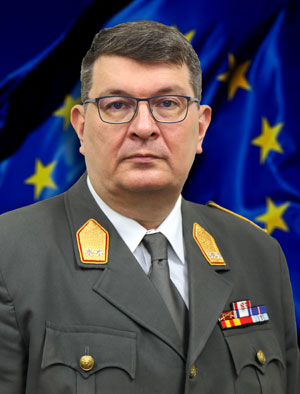
The basic decisions on the operation are taken by the Council of The European Union.
The Council decided to launch the operation following its approval of the Operation Plan (OPLAN) and the Rules of Engagement (RoE).
The EU's Political and Security Committee (PSC) exercises the political control and strategic direction of the operation, under the responsibility of the Council. Powers of decision with respect to the objectives and termination of the military operation remains vested in the Council, assisted by the EU Special Representative (EUSR) Ambassador Johann Sattler and High Representative of the Union for Foreign Affairs and Security (HR/VP) Mr. Josep Borrell.
The EU Military Committee (EUMC) monitors the proper execution of the EU military operation.
The EU Operation Commander (OpCdr) for ALTHEA Lieutenant General Brice Houdet is located at SHAPE with the EU Operation Headquarters (OHQ).
Major General Alexander Platzer is EU Force Commander.
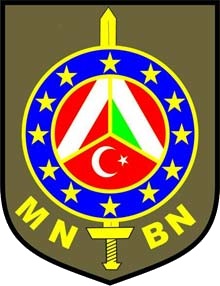
A total of 19 countries, including EU Member States and non-EU Troop Contributing Countries(TCC) are present within EUFOR.
(Albania, Austria, Bulgaria, Chile, Czech Republic, France, Greece, Hungary, Ireland, Italy, Poland, Portugal, Republic of North Macedonia, Romania, Slovakia, Slovenia, Spain, Switzerland, Turkey)
EUFOR has a Multinational Battalion which enables it to respond as required to support BiH authorities in the maintenance of a safe and secure environment. It has never been required to act in this capacity. EUFOR has a small footprint in terms of personnel, but has the ability to quickly bring in reserve forces from around Europe to supplement its capabilities. EUFOR has other assets which enable its work within BiH, including helicopters and an Explosives and Ordinance Disposal (EOD) team. It also maintains a network of 17 Liason and Observation Teams (LOT) throughout BiH which liaise with the local community and help to ‘feel the pulse’ of the situation.
Spanish servicemen stationed in Sarajevo contribute to the development of the Bosnian-Herzegovinian Armed Forces by advising them in terms of doctrine, interoperability, standardization and training. This will make them to obtain the same capabilities and qualities as the rest of the NATO countries.
Currently, Spain is contributing to the Althea Operation with 3 servicemen, one of them in Mons (Belgium) and the other two in Sarajevo (Bosnia and Herzegovina).
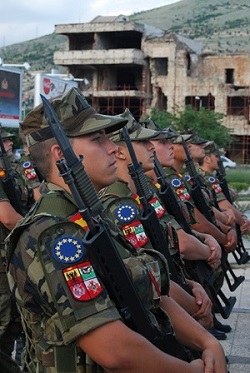
Bosnia-Herzegovina, one of the 6 republics that made up the former Yugoslavia, entered a period of bitter war in 1992, a war that cost the lives of over 100,000 people. Finally in 1995, with the assistance of the International Community and NATO, the war was brought to an end with the signing, in Paris, of the Dayton Accords. The long road to restoring peace and prosperity in this war ravaged nation had begun.
The 2003 Thessaloniki Declaration confirmed that the future of the Western Balkans, of which Bosnia and Herzegovina is both a central and significant part, lies within the European Union. Operation ALTHEA is one facet of a comprehensive and coherent European Union commitment to Bosnia and Herzegovina. It adds an extra dimension to the existing political engagement, assistance programmes and police and monitoring missions that are already underway.
On 2 December 2004, 9 years after the war ended, the European Union launched a military operation in BiH entitled Operation ALTHEA*. This followed the decision by NATO to hand over its own peacekeeping mission that had maintained security in the region since the war ended. The EU deployed a robust military force (EUFOR) at the same manpower levels as NATO’s SFOR (just under 7,000 troops) to ensure continued compliance with the Dayton/Paris Agreement and to contribute to a safe and secure environment (SASE) in BiH.
ALTHEA is the third and largest military operation that the EU has embarked upon to date. The European Military Force, known as EUFOR, is a manifestation of the European Security and Defence Policy (ESDP). From the ESDP has evolved the Common Foreign Security Policy (CFSP). The CFSP, in addition to the objective of strengthening the security of the Union in all ways, also has a prime objective of preserving peace and strengthening international security in accordance with the principles of the United Nations Charter.
2023
- 20 April. Commemoration in Mostar of the 30th anniversary of the start of the Spanish mission, attended by the Spanish CHOD, the Spanish Operational Commander, the Spanish ambassador to Bosnia-Herzegovina and the mayor of Mostar.
2022
- September 19th. The Spanish contingent stationed at EUFOR HQ in Sarajevo takes over at 'Camp Butmir'.
2021
- November 3rd. By Res. 2604/2021 the UN Security Council renewed the mission's mandate for another year.
- September 6th. The Spanish contingent stationed at EUFOR HQ in Sarajevo takes over at 'Camp Butmir'.
- March 17th. The Spanish contingent stationed at EUFOR HQ in Sarajevo takes over.
2020
- Between November 24 and 26, Exercise JOCEX was carried out by EUFOR HQ to simulate a natural emergency disaster.
- November 23rd. The EU High Representative for Foreign Affairs and Security Policy visits EUFOR HQ.
- Between August 21 and September 7, Exercise "Quick Response-20" was carried out, as scheduled.
- March 16th.The current rotation of Spanish personnel took over.
- January 16th. PSC approved OPLAN's revision 5, about some operational changes on the Operation.
2018
- September 19. Se produce el relevo del contingente.
- June 18. Tribute at Camp Butmir to the 23 heroes that gave their lives for Spain in BiH.
2010
- October 25. EUFOR Althea is transformed into a training and advisory mission for the Armed Forces of Bosnia and Herzegovina
2004
- December 2. The Stabilisation Force (SFOR) gave way to EUFOR Althea.
EMAD PRESS RELEASES ON EUFOR ALTHEA
-
Mostar's Plaza España, a point of union between Spain and Bosnia-Herzegovina 30 years after the start of the mission
Mostar's Plaza España, a point of union between Spain and Bosnia-Herzegovina 30 years after the start of the mission
2023/04/21Mostar, Bosnia and Herzegovina
More information -
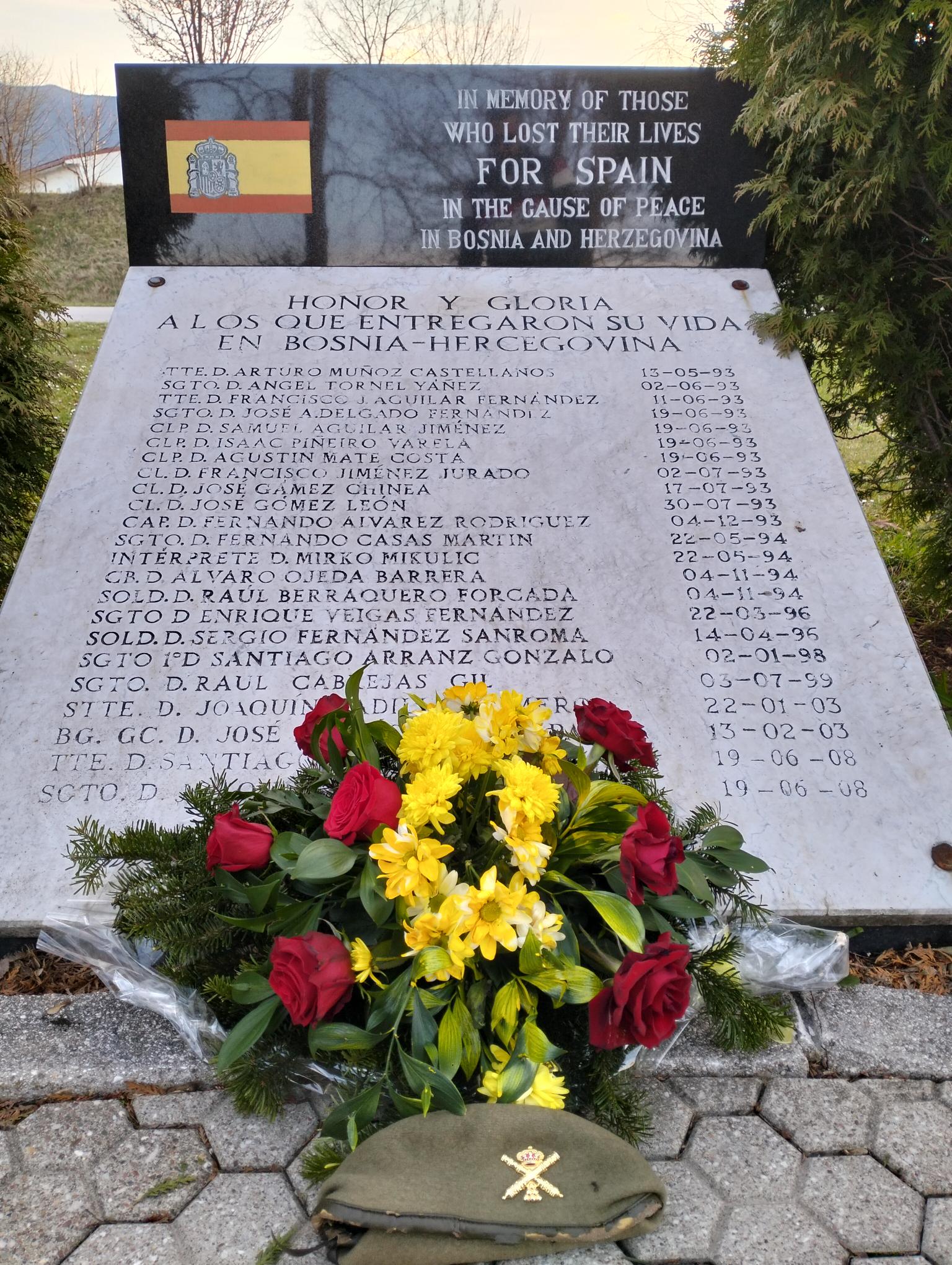
Tribute to the fallen in camp Butmir Sarajevo
Tribute to the fallen in camp Butmir Sarajevo
2023/03/23Bosnia-Herzegovina
More information -
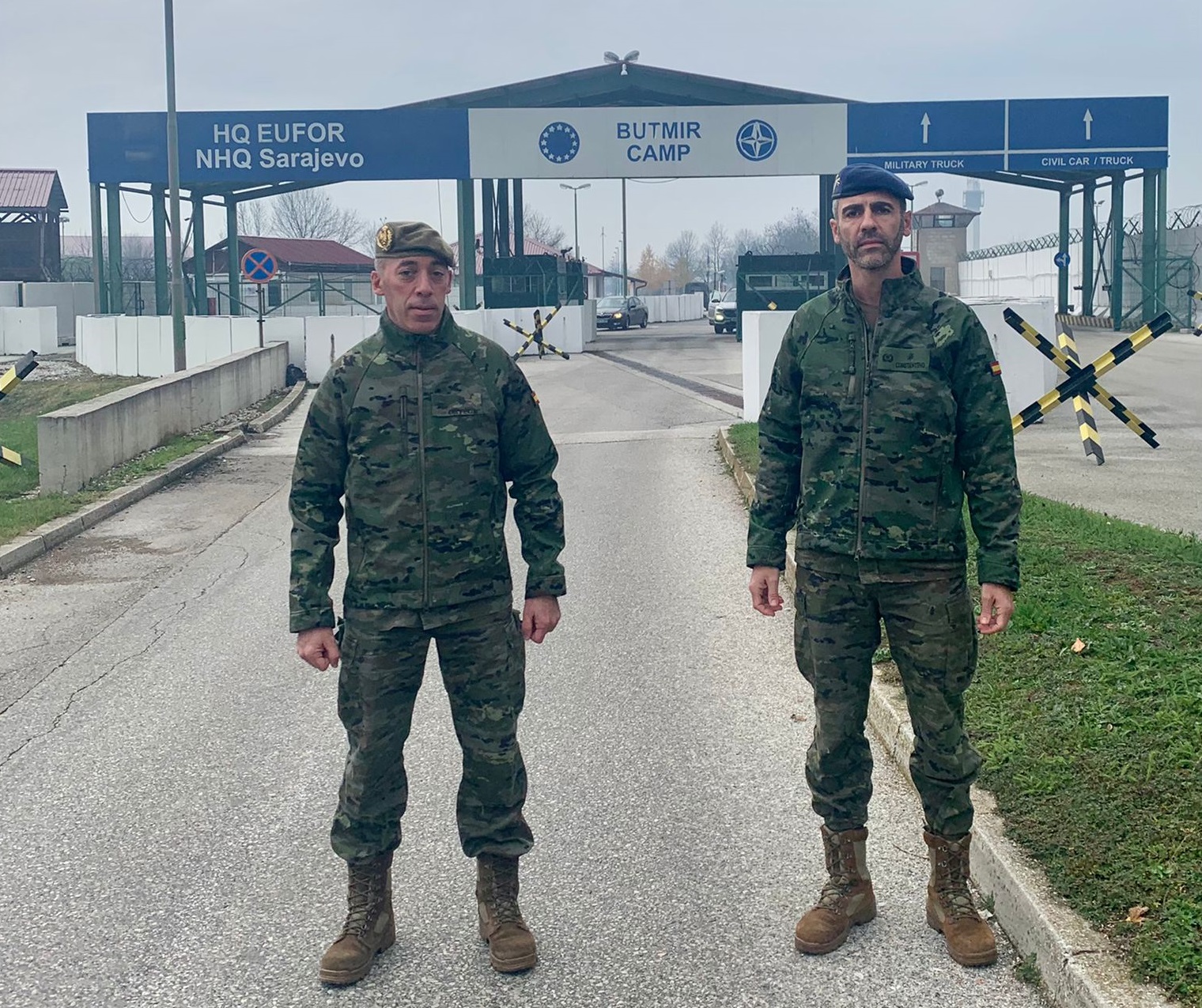
Spanish military at EUFOR Althea Headquarters
Spanish military at EUFOR Althea Headquarters
2021/11/23Bosnia i Herzegovina
More information -

Tribute to the fallen in Mostar
Tribute to the fallen in Mostar
2021/05/24Bosnia i Herzegovina
More information -
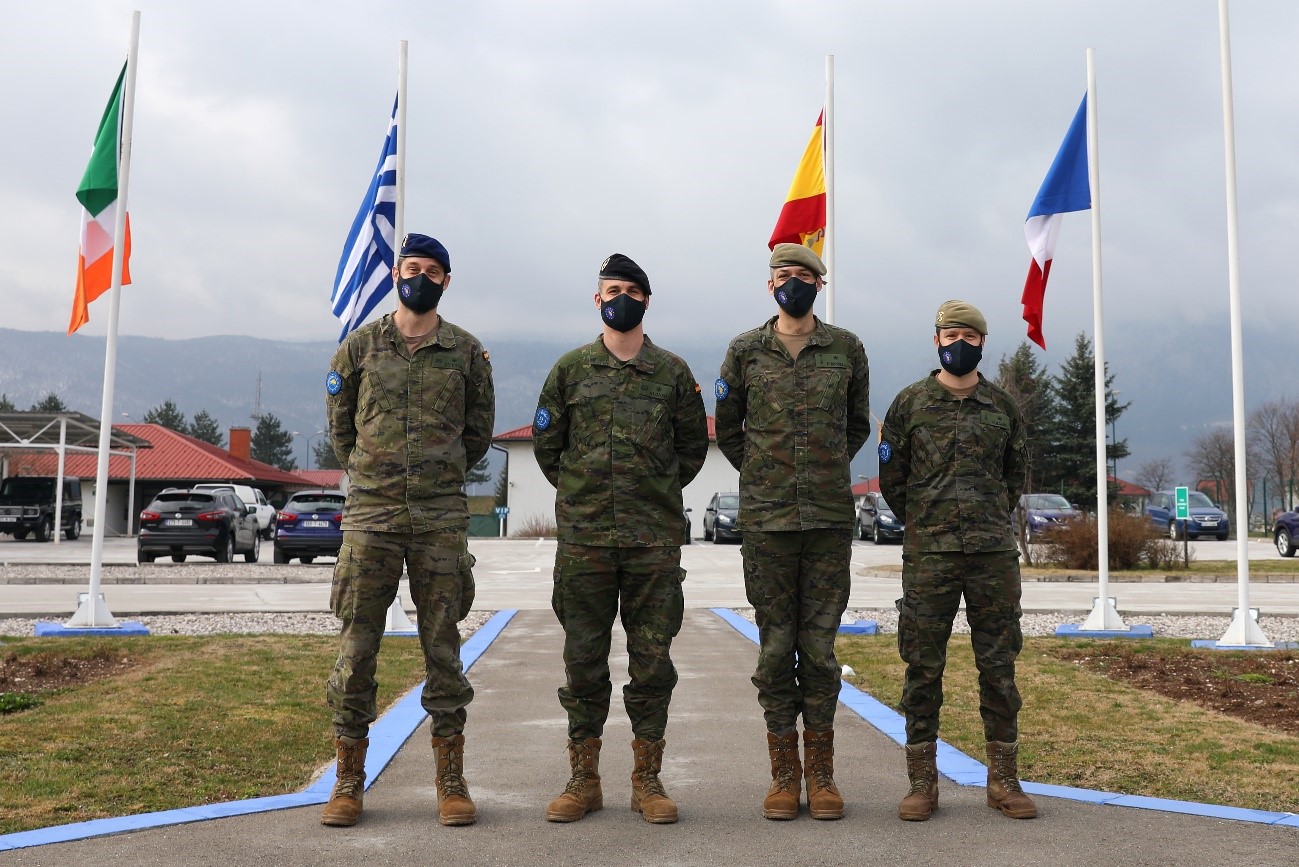
The Spanish contingent in EUFOR 'Althea' takes over
The Spanish contingent in EUFOR 'Althea' takes over
2021/03/22Bosnia i Herzegovina
More information

